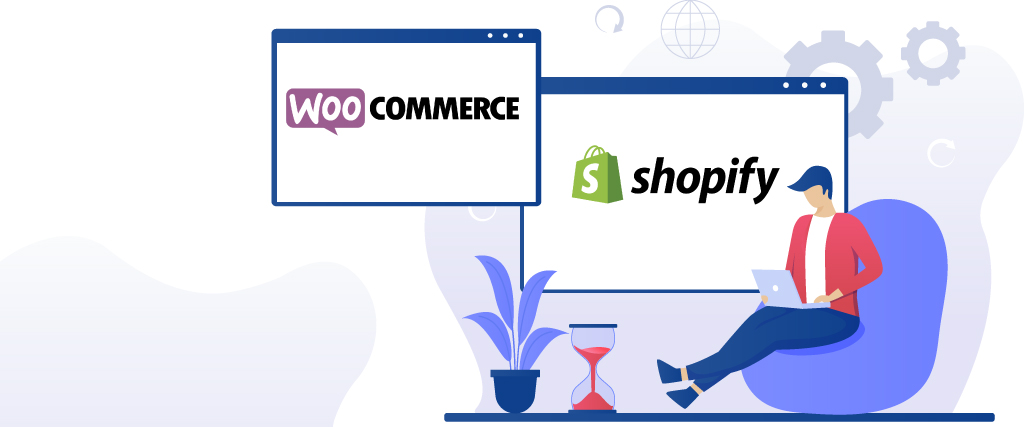Which one is best for your business, WooCommerce vs Shopify

WooCommerce vs Shopify: E-commerce has greatly altered the dimensions of the business world. Nowadays, with just a few clicks or a few swipes, you could do most of your business. It's a huge playground, in which everybody is striving to claim their place. Are you thinking of shifting your traditional physical store to a digital one? Not sure which platform to invest on? Well, we've made your work easier. Listed below are the two e-commerce platforms which are thriving in the business world lately. That's none other than WooCommerce and Shopify. And now, comes the question of which one to choose? If you're planning to launch an e-store, without any doubt you might have come across these two booming platforms. Both of them have their own merits, which makes it a hard decision to take. But, at the same time, one cannot unsee the demerits coming along. In order to finalize your choice, the below article might help you. Without any delay, let's get started diving more into the platforms.
What to look for in your eCommerce Platform?
If you're a newbie into this, then you might need to know about a few things when it comes to choosing the right platform. One should consider the below points to find the best e-commerce solution.- Budget- You should look at platforms that come under your range.
- Ease of use- Always goes for platforms that are beginner-friendly.
- Payment Methods- The platform should support various payment options.
- Scalability- Your e-Commerce platform should be able to scale with the emerging technologies to run your business successfully.
WooCommerce vs Shopify - A wide glance into WooCommerce
WooCommerce is an open-source eCommerce platform built as a plugin for WordPress. Thereby, it offers you the most powerful content management system to run your business. Thanks to its open-source feature, one can easily customize every element of their store and get custom extensions WooCommerce is the most popular platform with 28% of all e-commerce enabled websites currently using it. It was created by two developers, Mike Jolley and James Koster in 2011. Users usually opt for WooCommerce for many reasons, mostly because it's easy to launch and get started with, which is again a huge bonus point for new digital merchants. One can sell both physical and digital products, which's a pretty impressive feature, on WooCommerce. Once you get the hang of using WordPress, it's easier to navigate your way through WooCommerce and explore its impeccable features. If you're looking for a solution with great SEO features, definitely go for WooCommerce. Pros:- WooCommerce offers complete customization and control.
- It has quite a large community.
- The themes and plugins are endless and can be bought at a reasonable price if not for free.
- It is also simple to configure on WordPress.
- It keeps the track of income, profits, sales, inventory, and such factors clear and simple.
- It is a handy mobile app and can be accessed easily.
- And also WooCommerce plugin is free.
- It has various payment gateway support
- It offers high scalability.
- WooCommerce needs a few skills
- You might also find it a bit expensive due to extra plugins, themes, and hosting.
- One might get stuck while managing everything from hosting to security and maintenance to backups.
- One of the main turn-offs is 'test first, then update' on this platform.
WooCommerce vs Shopify - A broad view into SHOPIFY!
For starters, Shopify is a hosted eCommerce platform that helps you to build an online store with ease. The plans certainly cover all the aspects like hosting, security, domain, caching, etc. All you need is to buy the Shopify package and then VOILA you can start adding your elements to your e-store. Shopify is powerful, reliable, and easy to use, providing amazing templates and high customer support. It is quite popular due to its low startup cost and easy-to-use interface. It's a proven point that Shopify has been an excellent solution for many merchants, though with a few backlogs. Shopify is a cloud-based-SAAS (Software as a service) solution that allows businesses to set up an online store and sell their products from the safety of their homes. From startups, all the way to huge enterprises businesses can benefit from this platform due to its unlimited integrations, which helps to scale the software alongside your rising business. If you're new to e-commerce or don't want to bother about the technicalities. Then Shopify is your only stop. Pros:- Shopify costs you a reasonable amount every month.
- One gets to access thousands of apps to extend your store
- A bunch full of exquisite themes
- It manages everything right from hosting to security.
- It takes a little amount of time to launch your store.
- It has got a huge community support
- Shopify supports different types of eCommerce businesses.
- It's the right platform for dropshipping
- Your control over the site is limited
- You're stuck with the monthly payment if you want your store running.
- The additional plugins cost you more.
- Poor CMS
